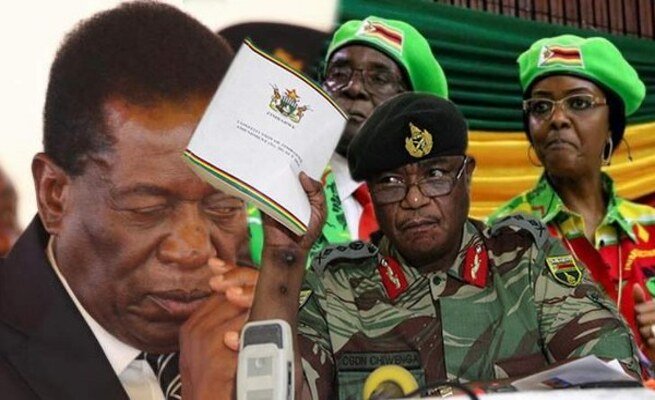Mnangagwa and Chiwenga rift laid bare

President Mnangagwa and his deputy Chiwenga
ZIMBABWEAN-born associate professor at the University of Oxford, Miles Tendi has poked holes into President Emmerson Mnangagwa’s biography and exposed the widening rift between the Zanu PF leader and his deputy, Constantino Chiwenga.
Early this month, former MDC-T policy adviser Eddie Cross released a 153-page book — A Life of Sacrifice — which tells the life history of Mnangagwa, from childhood to presidency.
But Tendi said the book sought to project Chiwenga in bad light, depicting him as a hardliner determined to frustrate Mnangagwa’s reform agenda. He said by signing copies of the book during its launch at State House, Mnangagwa effectively endorsed its contents.
He said the book also glorified Zimbabwe Defence Forces (ZDF) commander Valerio Phillip Sibanda, who took over from Chiwenga after the November 2019 coup, describing him as “possibly the best soldier in southern Africa and a man who was deeply respected in the army”.
Cross said Sibanda rejected a proposal by Chiwenga to put the country under a state of emergency and apply martial law when citizens took to the streets in protest against fuel price hikes in January 2019.
“Additionally, Cross maintains that when violence and looting occurred in January 2019, the Acting President Chiwenga ‘demanded that a state of emergency be declared and martial law be introduced. This would have effectively meant that the armed forces took over the administration of the State.”
However, Cross continues: “General Sibanda refused. He said his orders from the President were clear. What had happened was that the President had stamped his personal authority on the State. He would not tolerate any challenge.”
“His (Cross) biography suggests that Mnangagwa and Chiwenga are ill at ease with each other. Cross typecasts Chiwenga as obstructing political and economic reforms and as in favour of repressive and militarised State responses such as martial law,” Tendi noted.
Cross described Chiwenga as a hardliner who resisted Mnangagwa’s reforms on the electoral systems and relaxation of controls over the media and civil society, saying it would have a serious impact on the ability of Zanu PF to win the election.
“The biography depicts Vice-President Constantino Chiwenga, the former general who helped bring Mnangagwa to power in a military coup in 2017, in an unfavourable light,” Tendi said.
Cross writes that following Mnangagwa’s inauguration as President on November 24, 2017,“he set about selecting a new Cabinet and senior staff in the President’s Office. This was complicated by the demands being made by the senior military officers who had carried out what became known as the military-assisted transition (military coup). Chief among these was the commander of the armed forces, General Chiwenga”.
The Vice-President was one of the military generals who staged a coup against the late former President Robert Mugabe.
“Moreover, Cross contends that a grenade thrown at Mnangagwa on June 23, 2018 during a Zanu PF rally at White City Stadium in Bulawayo ‘was of Chinese origin and in use by the Zimbabwe National Army’.
“Chiwenga was present at the White City rally and his wife Marry sustained injuries from the blast but Cross, curiously, does not mention this — of the two Vice-Presidents only Kembo Mohadi is identified as present at the rally and as having sustained injuries along with 47 others.
“From the foregoing, Cross appears to be casting aspersions on Chiwenga as a political operator.”
Also critiquing Cross’ book, exiled former Cabinet minister and Zanu PF politburo member Jonathan Moyo sensationally claimed that Mnangagwa’s biography exposed lies the President has been spreading on his life experiences.
In both reviews, Moyo and Tendi revealed that Cross deliberately omitted events and details that would portray Mnangagwa in bad light, including the role he played in the Gukurahundi genocide in Matabeleland, which raised questions on the factuality of the biography.
The two also exposed Mnangagwa’s lies when he claimed that he was saved the hangman’s noose for bombing a train in 1965 because he was under the age of 21, when records show that he was saved by the court which ruled that he faced a less serious case.
“The fact that Mnangagwa’s 1965 court record went missing from the National Archives a long ago, only to resurface in the Eddie Cross book, has raised security eyebrows. Mnangagwa is hostile to books; he did not know his 1965 record is in his biography, before its publication!” Moyo tweeted on Thursday.
However, both Mnangagwa and Chiwenga have publicly denied allegations of bad blood between them.
— NewsDay




